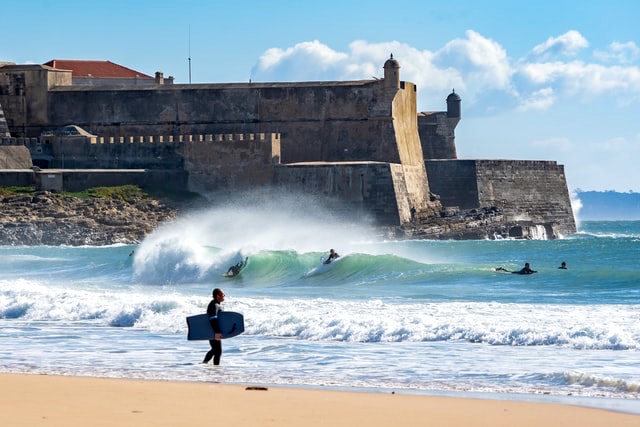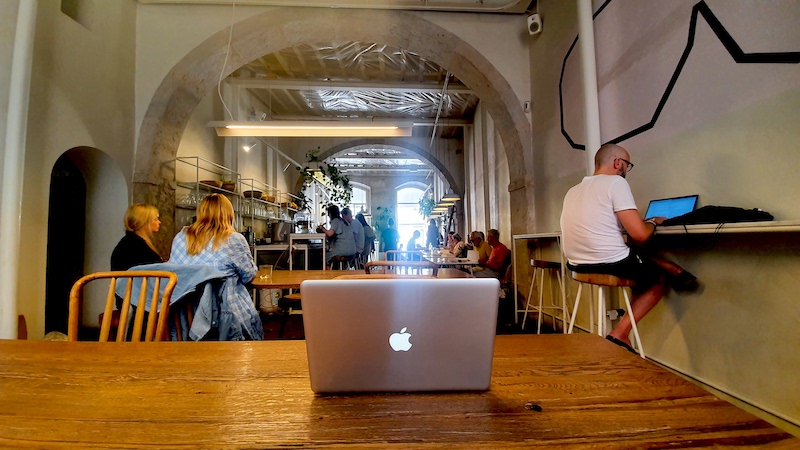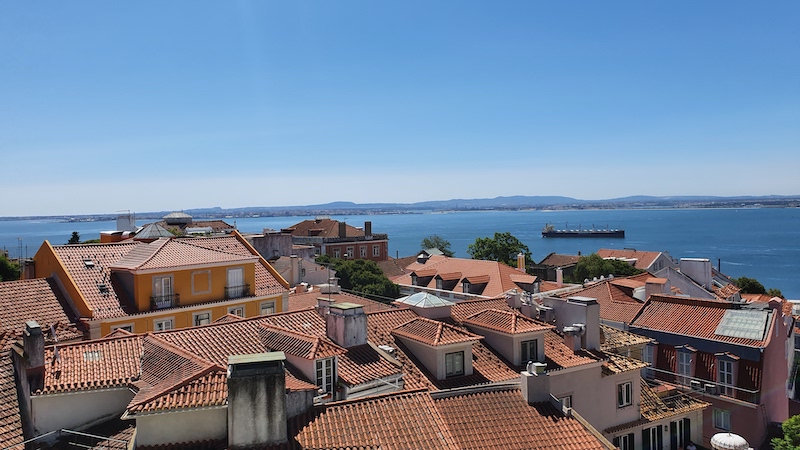Updated 2025. My views have changed slightly since I wrote this article and I wanted to share my latest feelings about life in Lisbon as a digital nomad and longer-term resident.
Most of what I originally wrote is still valid, however, I feel, Lisbon is now perhaps a victim of its own success.
Lisbon has become disproportionately expensive post-pandemic, especially when it comes to accommodation costs when compared to salaries that can be earned in Lisbon.
What you would have paid for a small studio or 1 bed (T1) apartment in Lisbon centre will barely get you a room in a shared flat and even that can be difficult to find!
A basic apartment is likely to cost €1000 – €1200 + per month and a room in a shared flat €500 plus per month if you are lucky.
While the rents may still be considered affordable for a well-paid digital nomad or expat, the city is simply not affordable for local people whose entire monthly salaries might just about pay the rent with nothing left over to live on.
Just a few years ago, locals could afford to live downtown and in areas like Alfama, these days it’s near impossible.
Now, this is the case for most if not all European capitals, it’s just that Lisbon has only just caught up and it’s changing the feel and vibe of the city.
Aside from rising accommodation costs, the Lisbon downtown area gets overcrowded during the peak seasons and feels like a playground for tourists, Tuk Tuks, well-off expats and digital nomads.
Where there were once charming little independent shops has made way for souvenir shops and endless brunch cafes.
This has ended up eroding some of the local charm I first experienced when I moved to the downtown Baixa area back in 2020.
All this being said, Lisbon is still a popular and valid digital nomad destination for plenty of reasons, the great weather, a vibrant digital nomad / expat scene, the history, architecture, great food and drink, proximity to beaches, safety and so on.
One of the highlights of Lisbon as a digital nomad destination is the active social life and ease in which to meet people. There are lots of meetup groups, events and activities going on and it’s incredibly easy to strike up conversations in cafes with fellow digital nomads.
The main difference compared to the past is that while Lisbon is still popular and a great digital nomad destination for a few months, it’s perhaps not quite as attractive as it once was and there are other digital nomad destinations that might offer better value for money and a more authentic experience.
Back to my original thoughts in 2020
I arrived in Lisbon in 2020 in the first months of the pandemic and despite the pandemic conditions I immediately fell in love with the city. I live in and remotely work in Lisbon and can fully understand the attraction for digital nomads.
In no particular order, I have put down a few thoughts on why I personally love Lisbon and perhaps why it’s such a magnet for digital nomads.
Let’s get started.
Below is a summary of my feelings about Lisbon as a digital nomad destination, a place to visit for a city break or if you are really lucky, a city you can be proud to call home!
The Portuguese are warm and kind people
The people and culture can really make the difference in any city. The Portuguese people are in my experience so humble and genuinely welcoming.
I have felt truly at home since I arrived in Lisbon. The city is very multicultural and home to so many different nationalities and this adds to the charm, diversity and vibrancy.
Lisbon has an almost small-town chilled vibe for a European capital city
This is of course very subjective, but I would say for a capital city, Lisbon is pretty chilled.
You get everything you would expect from a European capital city in terms of culture, nightlife, infrastructure, diversity of people and so on, but at the same time, there is a relaxed vibe that is very infectious.
As soon as you walk the streets you can feel it and see it on the faces of the people, locals and tourists alike.
Lisbon is a very authentic city with its own original flavour
Lisbon isn’t trying to be anything else or copy any other city, often people talk about Lisbon being the new Barcelona or the new Berlin but that’s just comparisons.
In actual fact, Lisbon is Lisbon, it doesn’t need or want to be a Barcelona or a Berlin even though both are cool cities in their own right.
Lisbon is the third sunniest city in Europe with over 2799 hours of sunshine!
It surprised me to learn that Lisbon is the third sunniest city in Europe with 2799 hours of sunshine and comes after Marseille in France with 2858 hours and in top place, Valletta in Malta with 2957 hours.
Of course, sunshine isn’t everything but it certainly helps.
Lisbon is often referred to as the city of light and I can certainly agree, it’s very luminous and great for photography and filmmaking.
Lisbon is very close to the Atlantic ocean and cool surfing spots

Lisbon is less than 30 minutes from the beaches of Carcavelos (image above) and Costa da Caparica. Both are popular surfing hotspots.
Unlike say Barcelona, Lisbon city centre is not actually directly on the beach, instead, there is the river Tejo which can seem ocean-like and this river leads onto the Atlantic ocean.
There are many riverside bars to enjoy a coffee or a drink if you don’t have time to go to the beach during the week.
When the beach does call, it’s only about 30 minutes from the city. Carcavelos beach, the closest proper beach from Lisbon centre is easily accessible by a regular and affordable train service that runs every 20 minutes from Cais do Sodre train station.
The alternative is to cross the river and visit Costa da Caparica, this is easiest by taxi or Uber and can take 30 to 45 mins depending on traffic.
Some of the beaches close to Costa da Caparica are truly beautiful and highly recommended like Fonte da Telha which I would describe as a more natural beach with only nature adding to what is already a beautiful spot.
There are some cool beach bars around there to enjoy a sunset drink or dinner or of course eat and drink during the daytime.
Lisbon is one of the oldest capital cities in Europe
Many people are not aware that Lisbon is actually one of the oldest capital cities in Europe, older than London and comes second to Athens in Greece.
Lisbon is said to be four centuries older than Rome! This history adds an enormous amount of charm, character and culture to Lisbon.
Eating and drinking in Lisbon

Lisbon for a capital city is not super expensive for eating and drinking and on the whole, the quality and choice is really good.
There are still some relatively cheap places to grab a coffee and a typical Bifana sandwich although this is becoming increasingly difficult to find downtown.
A Bifana sandwich in case you are wondering is one of the local specialities and sadly not one for vegans or vegetarians, however, for the meat-eaters it’s a sandwich that contains thin slices of pork that are marinated in a sauce made of white wine, garlic, paprika and is usually served on soft rolls with a good dollop of hot Piri Piri sauce and mustard.
One of the things you must try when in Lisbon is the famous Pasteis de Nata (photo above), a delicious custard tart that is one of the signature sweet snacks to be found all over Lisbon.
The two most popular places to grab a pasteis de nata are from Manteigaria who have several outlets including one inside the Time Out market in Cais do Sodre, another on Rua Augusta which is a popular pedestrian street leading to the river Tejo that has the famous arch on the river end and Rossio Square at the other end.
Manteigaria is the new kid on the block when compared to Pasteis de Belem, a famous maker of Pasteis de Nata in the Belem area of Lisbon and around since 1837.
Both are really delicious and which one is better is a matter of taste. When visiting Lisbon don’t leave without tasting pasteis de nata and they also travel quite well if you would like to take a taste of Lisbon back home to loved ones.
If you are vegan or vegetarian, fear not, there is an abundance of choice when it comes to plant based foods. Almost all restaurants and cafes offer vegan and vegetarian options.
If you are after cocktail bars and fine dining there are plenty of high-end restaurants and rooftop bars offering fine wines, gin tonics and creative cocktails.
With the growth of tourism has come plenty of cafes and trendy brunch locations that are all the rage with the Instagram crowd and digital nomads of course!
Whatever your tastes or budget you are sure to find it in Lisbon. What should be remembered is that Lisbon is still developing and as soon as you leave the popular downtown areas and visit one of the other less touristy neighbourhoods you’ll find a more local vibe which can also be more affordable.
Things to see and do in Lisbon, Portugal
Visitors, residents and digital nomads alike are presented with a huge amount of things to do in Lisbon. Some of the most popular places to visit in Lisbon include the historic Alfama district, the 16th-century Belem Tower, the Jeronimos Monastery and the hip LX Factory to name just a few.
We have created a separate guide to some of the best things to see and do in Lisbon if you are looking for some inspiration.
Lisbon is a really safe city
Lisbon is an incredibly safe city. Portugal ranks as the third safest country in the world only after Iceland and New Zealand.
I can attest to this personally, even in the depths of the pandemic I never felt unsafe in the city. Of course, no place is 100% safe and crime does happen but it’s really not something to worry about.
As with all travel, it’s always wise to keep your wits about you and use common sense when it comes to your valuables as all popular tourist locations will attract pickpockets and petty crime.
Transportation in and around Lisbon
Lisbon has a very good and reliable public transport system including a metro that connects to the airport.
Believe it or not, a one way trip from the airport to the downtown area costs just €1.80 for a 30 min journey to the Baixa downtown area.!
There are taxis and also Uber and Bolt operate in Lisbon and are really quite affordable with a short trip often costing just a few euros.
There are buses and also trams including the beautiful original old-style trams that add so much to the charm of the city of Lisbon.
Lastly, there are regular boat transport services to cross the river and I would recommend catching a sunset from the other side of the river.
Culture and a very active meetup community in Lisbon
Lisbon is chock full of museums, attractions, concerts, clubs and everything else you could want as you would expect in a capital city. The Meetup app and community are very active in Lisbon and in particular, the Lisbon Digital Nomad meetup group in Lisbon is one of the largest out there with several thousand members and regular meetups going on.
Aside from this, you’ll find a huge amount of meetups going on in the city, from language exchanges to socials to salsa dancing and more.
A tech hub attracting startups and entrepreneurs
Lisbon has been attracting bright minds for a while now, it often surprises me just how many very smart people are choosing Lisbon as a base.
The huge tech event Web Summit has been held in Lisbon since 2016 and many see Lisbon as the next Berlin or Barcelona in terms of being a startup hub. Crypto heads also found their way to Lisbon due in part to crypto-friendly taxation and also down to Lisbon attracting tech talent and Lisbon being Lisbon of course.
Lisbon consistently ranks among the world’s top and most popular destinations for digital nomads
When it comes to the digital nomad lifestyle, Lisbon is usually at the top of most lists.
In 2022 real estate specialists Savills put Lisbon at the top of their list of digital nomad destinations alongside Miami and Dubai when taking into account factors such as internet speed, quality of life and climate amongst some of the key factors.
Taxation and the Non-Habitual Resident (NHR) program
Updated – The NHR was abolished and now there is a NHR 2.0 which is perhaps not as generous as the original NHR but still could be beneficial. It’s best to get professional advice on this.
Portugal has a special 10-year tax incentive to attract talent to the country. This is known as NHR or the Non-Habitual Resident tax program. There is a list of occupations that qualify and the tax rate is a maximum of 20% and in some cases, it’s possible to enjoy earning tax-free in the form of dividends however it’s perhaps a bit of a grey area and a specialist tax advisor should be consulted.
One of the beauties of NHR is in the name, “non-habitual resident”. Let’s say you want to or need to spend extended periods of time in other countries for whatever reason.
Once you have NHR status you simply need to ensure you have a residential address all year round, whether that be rented accommodation or a property of your own and you are set. This is just a quick overview and we are not tax specialists, we’d advise looking into this though as it could be the cherry on the cake when it comes to choosing Lisbon for a longer-term place to hang your hat!
Does Portugal offer a digital nomad visa? (updated)
As of October 22nd 2022, Portugal offered a digital nomad visa.
The digital nomad visa requirements are that you must earn at least four times the national minimum wage to live and work in Portugal.
That is approximately $3350 or €3040 and you should have at least €36,480 in savings.
The Portugal Digital Nomad Visa is available in two types, the long-term residency visa is initially for 4 months and can be extended to 2 years or you can get a temporary stay visa valid for 12 months but this does not grant residency.
It really depends on your plans. If you don’t wish to live in Portugal long term then the temporary one is a good choice, but, if you would like to live in Portugal and make it your home the first option is the way to go.
If you are an EU citizen you are free to travel to and work in Portugal without the need for any kind of visa and stay as long as you wish as a result of freedom of movement within EU countries.
If you are from the USA for example, it’s possible to visit and stay in Portugal visa-free for up to 90 days in a 180-day period. Post-Brexit citizens of the UK are in a similar position to people from the United States and can stay up to 90 days in a 180-day period without the need for a visa.
Citizens from a pretty large list of countries are able to stay visa free in Portugal for up to 90 days.
It should be noted that this visa-free stay in Portugal is for touristic purposes and does not allow you to be employed in Portugal or stay long term, for this you would require a visa.
D7 Visa in Portugal
The Portuguese D7 visa allows you to stay longer term in Portugal if you would like to stay beyond the 90-day limit and also offers a pathway toward permanent residency, even Portuguese citizenship. There is also the possibility if you qualify, to apply for the NHR tax status (see above).
A D7 visa can give you access to the schooling system and your family (spouse, children, parents) are able to join you as dependents.
For more people, especially digital nomads on the move around the world the 90 day tourist visa should be sufficient, however, if you would like to base yourself in Portugal for the long term then a D7 Visa might be the way to go.
Learn more about getting residence in Portugal from the official SEF website : https://imigrante.sef.pt/en/solicitar/residir/
Check out our hand picked selection of laptop friendly cafes and co-working places to work from in Lisbon

There is an abundance of very cool cafes and actual co-working facilities to work from in Lisbon. We have compiled a list of some of our favourite places to work to take your laptop, enjoy great coffee, healthy food and good vibes in Lisbon.
Check out our selection of the best laptop-friendly cafes to co-work from in Lisbon
As an accommodation specialist for digital nomads, we cannot forget to talk about places to stay!
Lisbon on the whole is a very affordable city to live in when we look at almost all expenses except for accommodation, especially in prime downtown locations.
When compared to other popular European capitals Lisbon isn’t particularly expensive when it comes to places to stay, however, it isn’t cheap either.
There are many other digital nomad destinations where accommodation is way cheaper. In Lisbon you can expect to pay around €1000 euros for a small apartment on a long-term basis or €1000 + for co-living spaces on a monthly basis and that’s still on the more affordable end of the spectrum.
Once you have covered accommodation costs the rest is pretty affordable, eating out, supermarkets, transport and most other daily costs.
Lisbon wrap up
There you go, here are just a few thoughts about Lisbon as a place to live and work and I have to say, after spending time in various countries, cities and villages, Lisbon offers me a great mix of the things I value in life and would recommend visiting and trying it for yourself.
Of course, everyone has different tastes, needs and wants but in general, it’s hard to find reasons not to visit or remote work from the great and beautiful city of Lisbon.
As mentioned at the beginning of the article, after just over three years I have seen many negative changes in Lisbon, similar to what happened in Barcelona, in fact Barcelona is now less expensive than Lisbon when it was the opposite just a few short years ago.
All that being said, Lisbon is a beautiful, historic city and there’s a reason why it’s so popular!


